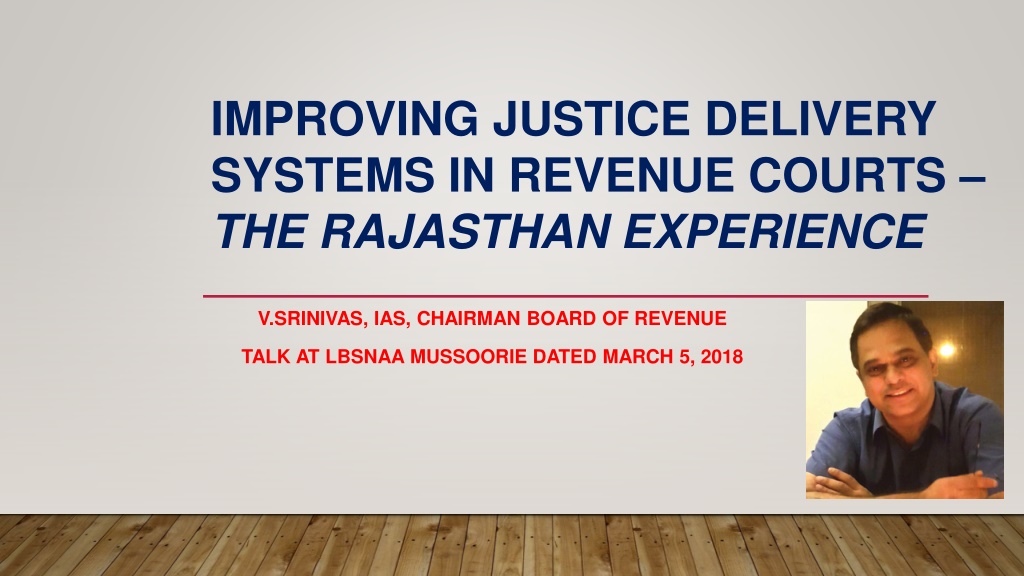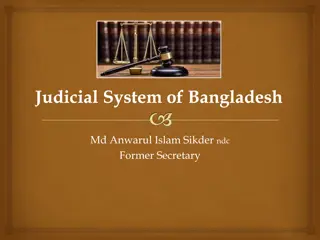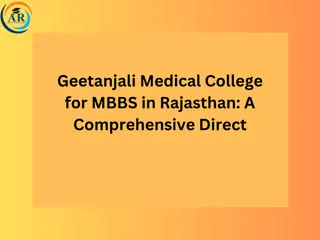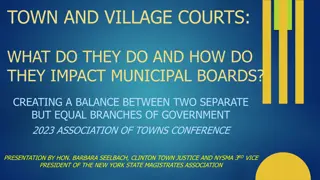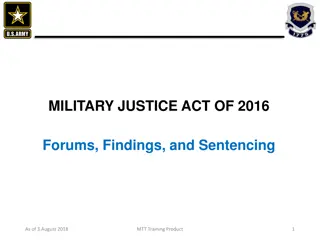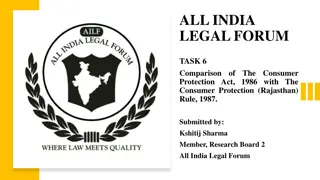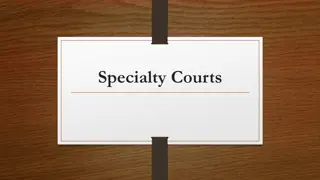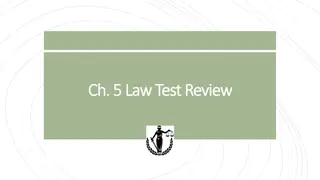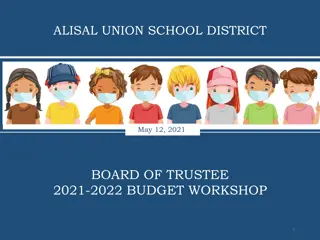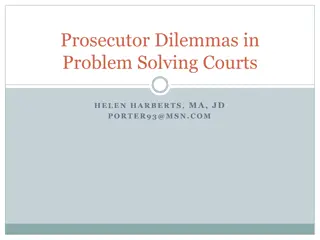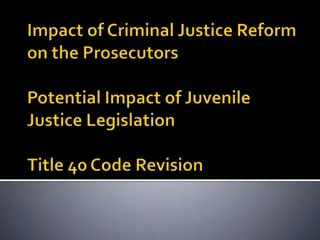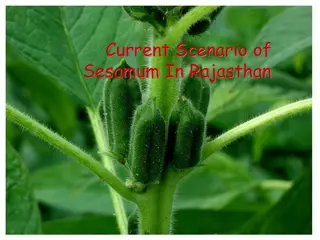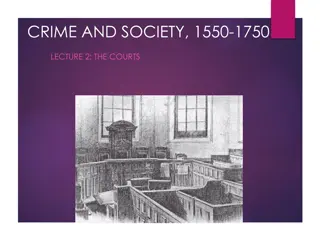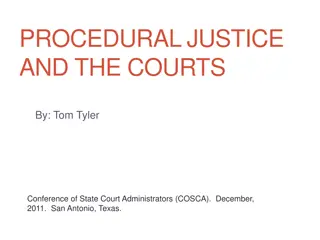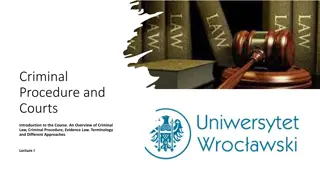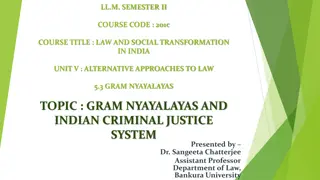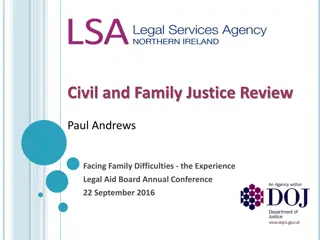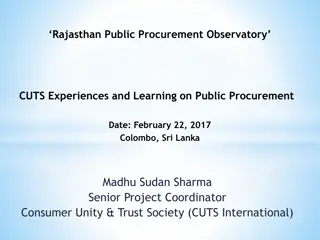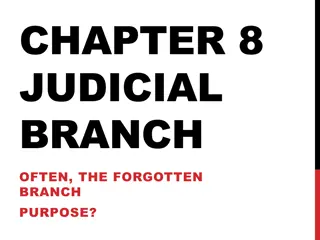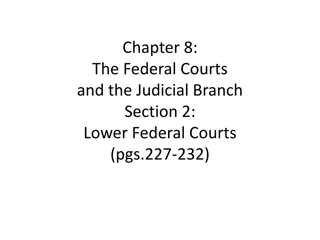Enhancing Justice Delivery in Revenue Courts: Rajasthan's Approach
Land plays a crucial role in rural development, and effective land administration is key. This article delves into the role of the Board of Revenue in Rajasthan, highlighting its significance, composition, and responsibilities in revenue matters.
Download Presentation

Please find below an Image/Link to download the presentation.
The content on the website is provided AS IS for your information and personal use only. It may not be sold, licensed, or shared on other websites without obtaining consent from the author. Download presentation by click this link. If you encounter any issues during the download, it is possible that the publisher has removed the file from their server.
E N D
Presentation Transcript
IMPROVING JUSTICE DELIVERY SYSTEMS IN REVENUE COURTS THE RAJASTHAN EXPERIENCE V.SRINIVAS, IAS, CHAIRMAN BOARD OF REVENUE TALK AT LBSNAA MUSSOORIE DATED MARCH 5, 2018
INTRODUCTION Land - the summum bonum of rural existence, and agricultural structure is the most important determinant of India s development. As land is the critical income generating asset of rural India, effective administration of land is a vital function of the State. The critical Land Reforms legislations are the Land Ceiling Act, the Tenancy Act and the Land Revenue Act. The implementation of India s Land Reforms policies is mandated on 2 critical institutions the Board of Revenue and the District Collector/ Sub- Divisional Officer.
THE BOARD OF REVENUE FOR RAJASTHAN The Board of Revenue is the Chief Controlling Revenue Authority under all enactments in force. Being the Chief Controlling Revenue Authority, it acts as a limb of the State Government exercising powers vested in it under the various enactments. It is the highest Revenue Court of Appeal, Revision and Reference in Rajasthan having wide powers of general superintendence and control over all subordinate courts. In 1974, the State Government has delegated its Revisional powers in cases of a non-judicial nature, and not connected with Settlement. The Land Records work has also been entrusted to the Board which is administrative in nature and a very important responsibility.
THE BOARD OF REVENUE FOR RAJASTHAN Amongst the oldest Boards of Revenue in India Uttar Pradesh, Bihar, Madhya Pradesh, Tamil Nadu and West Bengal. It is the largest in terms of number of members and currently handles 65000 revenue cases. The Rajasthan Taxation Tribunal was separated from the Board of Revenue in 1984 and was further upgraded as the Rajasthan Tax Board in 1999. The Rajasthan Board of Revenue Ordinance,1949 was promulgated under which the Board of Revenue for Rajasthan was constituted. The Ordinance was repealed and the Board of Revenue was created under the Rajasthan Land Revenue Act and governed by Chapter II of the Act of 1956. The Rajasthan Land Revenue (Qualification and Conditions of Service of Chairman and Members of the Board) Rules 1971 were notified by the State Government to regulate the service conditions of the Chairman and Members of the Board of Revenue.
ROLE OF BOARD OF REVENUE IN REVENUE MATTERS
ROLE OF BOR IN REVENUE MATTERS Section 4 Establishment and Composition of the Board 20 members Section 5 Tenure of the Members - appointed by Government Section 6 Place of Sitting anywhere in Rajasthan Section 7 Ministerial Officers Registrar + 3 Deputy Registrars
ROLE OF BOR IN REVENUE MATTERS Section 8 Powers of the Board:The Board is the highest revenue court of appeal, revision and reference in Rajasthan. The Board of Revenue exercises 3 kinds of powers (a)Appeal, (b) Revision and (c) Reference. The Board of Revenue is a Court under Article 375 of the Indian Constitution and Section 5(35) of the Rajasthan Tenancy Act with full powers to initiate contempt of court proceedings for breach of orders issued by it. Section 10 Jurisdiction of Board how exercised - (i) Single Benches and (ii) Double or Larger Benches
ROLE OF BOR IN REVENUE MATTERS Section 11 Power to Refer to a Bench:: The Chairman or any Member sitting singly for the disposal of any case or proceeding may, if he thinks fit, for reasons to be recorded in writing, refer any question of law or custom having the force of law for the opinion of a Bench and the case shall be disposed of in accordance with such opinion Section 12 Power to refer question to High Court: If in any case it appears to a Bench that any question as is referred to in Section 11 is of Public Importance and that it is expedient to obtain the opinion of the High Court thereon, the Bench may refer the question to that Court. Section 13 Decision in case of Difference of Opinion: Where the members are divided in opinion as to the order to be made in the case, the case shall be referred to another member and made in accordance with the opinion of the majority of the members including such other members who hear it. Section 14 Registers of the Board:
LAND REFORMS IN 21STCENTURY STRUCTURAL REFORMS Digitization of land records in a single standardized format across various departments Overhauling litigation in land with reduced timelines and fast tracked courts and judicial processes Rationalizing stamp duty and reducing the burden of stamp duty. Streamlining property registration system and linking land records to stamp registration Streamlining the process to seize collateral under the SARFAESI Act Providing easy access to Government data and other land related information.
LAND RIGHTS AND SECURITY OF TENURE The Rajasthan Land Revenue Act 1956 and the Rajasthan Tenancy Act 1955 represent powerful instruments in the hands of the State to ensure Land Rights and Security of Tenure. It is the State s job to protect Land Rights and ensure security of tenure. Rajasthan s Revenue Administration needs to ensure that tenants with secure land rights are encouraged to make investments in land.
CRITICAL LEGAL PROVISIONS PROTECTION FOR VULNERABLE SECTIONS
LAND RIGHTS AND SECURITY OF TENURE Section 63. Tenancy when extinguished The interest of a tenant in his holding or a part thereof as the case may be shall be extinguished (iv) when he has been deprived of possession and his right to recover possession is barred by limitation. The Board of Revenue has ruled that the Revenue Courts have no powers to grant khatedari rights on adverse possession. Once a tenancy is extinguished under this section, the Courts must repose the Khatedari rights in some other person, khatedari rights will not remain in medio in the State as Landholder.
LAND RIGHTS AND SECURITY OF TENURE S.212. Provision for injunction and appointment of a receiver (1) If in the course of any suit or proceeding under this Act, it is proved by affidavit or otherwise That any property to which such suit or proceeding relates is in danger of being wasted, damaged or alienated by any party thereto, or That any party to such suit or proceeding threatens or intends to remove or dispose of the said property in order to defeat the ends of justice. The Court may grant a temporary injunction and if necessary appoint a receiver.
LAND RIGHTS AND SECURITY OF TENURE Temple Lands: The Deity is a minor in perpetuity whose rights must be protected. Necessary action for initiating References under Section 82 in all cases of alienation. Daughter s Rights: The Board of Revenue has emphasised on equal rights to women while sanctioning mutations. All mutations of inheritance must be opened not only in the names of widow and male heirs but also contain the names of daughters
VIEW FROM THE DISTRICTS CHALLENGES ABOUND
BOOSTING INDUSTRIALIZATION BHILWADA DISTRICT FEATURES ARE HIGH NUMBER OF REGISTRATION DOCUMENTS, TIMELY RESOLUTION OF LAND DISPUTES The two major steps that Revenue Administration has pursued for boosting industrialization and ease of doing business are the following: All Revenue Courts of Bhilwada to be fully digital institutions Effective linkage between Sub-Registrar Offices and Tehsils to ensure timely mutations and entries in record of rights.
CHALLENGES IN LARGE AGRARIAN DISTRICTS NAGAUR DISTRICT: vast geographical spread with 1700 villages. A largely agrarian economy necessitates large deployment of Revenue Officials. Inspections and night halts are the most effective way of improving field level governance. Farmers need timely credit availability -The Jandhan and Aadhar based mandatory linkages for availing bank loans has necessitated consistency in recording of entries in land records. Agrarian districts are witnessing large number of cases for division of holdings.
GROWING URBANIZATION & TENANCIES OF CHAMBAL COMMAND KOTA - faces the complex challenge of tenancies in Chambal Colonization lands. The Rajasthan Tenancy Act Section 15-AA Non-Accrual of Khatedari rights in Chambal Project Area governs tenancies of Chambal Command Areas. Khatedari rights in Colony areas shall accrue only in accordance with the provisions of the Rajasthan Colonization (Chambal Project Government Lands Allotment and Sale) Rules 1957. Growing Urbanization: SDO Kota has 8 Patwar circles in the urban limits where agricultural lands are being developed for urban needs with residential plots being developed. The number of cases for partition of holdings in the court of SDO Kota and ACM Kota reflect the trends of growing urbanization.
CHALLENGES IN IGNP COMMAND BIKANER -The IGNP is one of India s largest and most complex irrigation systems, with 15 lac hectares of command lands in the Thar desert. Familiarity with IGNP: For effective revenue administration, SDO s and Tehsildars must visit the IGNP command area to familiarize themselves with warabandi practices, irrigation/ CAD department s patwaris and engineers, Colonization department s officials and above all meet settlers who have cultivated and transformed the IGNP.
RADICAL REFORMS AND TRANSFORMATIONAL GOVERNANCE THE FIRST DIGITAL REVOLUTION IN REVENUE COURTS
THE FIRST DIGITAL REVOLUTION IN REVENUE COURTS ADMINISTRATION Digital Rajasva Mandal - Launched on September 27, 2017, the Board of Revenue has placed online all court judgments being pronounced in the Board. Rajasthan Revenue Courts Grid: launched on November 2,2017 and has been implemented in all subordinate courts uptoTehsil level. Almost 2 lac judgments have been placed online. It would be further developed to encompass the detailed stage wise monitoring of case pendency. Further the time consuming process of service of summons and calling for file records has been digitalized. An SMS facility for advocates introduced in all new admission cases.
IMPROVING JUSTICE DELIVERY SYSTEMS Court Sittings by Chairman BOR - spent 21 days/ month on the bench with an average of 4 hours a day. Inspections of Subordinate Courts - visited 16 districts of Rajasthan and interacted with the Revenue Appellate Authorities, the Divisional Commissioners, the District Collectors and the Sub-Divisional Officers. Improving Bench Bar Coordination Regular interactions with District Bar Associations and Rajasthan Revenue Bar Association. it takes about 5 years for a suit to be decided at the Trial Court level, 2 years at the first appellate level and 15 years at the 2ndAppellate level the total journey is taking 22 years.
TRANSFORMATIONAL CHANGES INTRODUCED IN THE BOARD OF REVENUE Streamlining the work of the Registry Placing high emphasis on reference cases of common lands and mandir lands Increasing the disposal of appeals being heard by Double Benches Implementing the Digital Rajasva Mandal in mission mode and operationalizing the Rajasthan Revenue Courts Grid Improved Justice Delivery system necessitates breaking down the various judicial processes to individual actions and ensuring effective action on each one of these processes.
COURT SITTINGS & JUDGMENT WRITING Predictability and Consistency of Court Sittings: All Sub-Divisional Courts to function from 10.30 am to 1.30 pm for 3 days in a week and the Assistant Collector Courts to function from 1030 am to 1.30 pm for 5 days of the week. Further the Subordinate Courts have been advised to devote adequate time to file reading and judgment writing. Quality of Judgment Writing: To improve the quality of judgment writing in Trial Courts, SDO s have been advised to ensure that in all Suits the provisions of the Civil Procedure Code (CPC) must be followed. Judgment writing must be in accordance with Order 20 Rule 5 of CPC and issue based judgments must be given
RESULTS BASED GOVERNANCE The Board of Revenue has decided 1026 cases in January 2018 as compared to 545 cases decided in August 2017. This doubling of decisions in a short period of time was possible with the streamlining of the work of Registry by (a) ensuring the number of completed cases to be listed before the Double Benches are significantly enhanced (b) intense follow-up on the cause lists of reference cases of common lands and mandir lands. The Double Benches of the Board of Revenue have been persuaded to decide an average 5 second appeals/ sitting. The Board has heard arguments in several afternoon sittings, sending out the message that if the Counsels are ready to argue their cases, the Bench will always be available to hear them for speedy justice.
CONCLUSION The litigant has to remain the centrality of the journey in Revenue Courts. Consistency and predictability of sittings and intense commitment to the cause of land reforms have enabled the Board of Revenue for Rajasthan to help millions of litigants of the State while ushering in radical reforms, transformational changes in governance, enabling the march to New India 2022.
